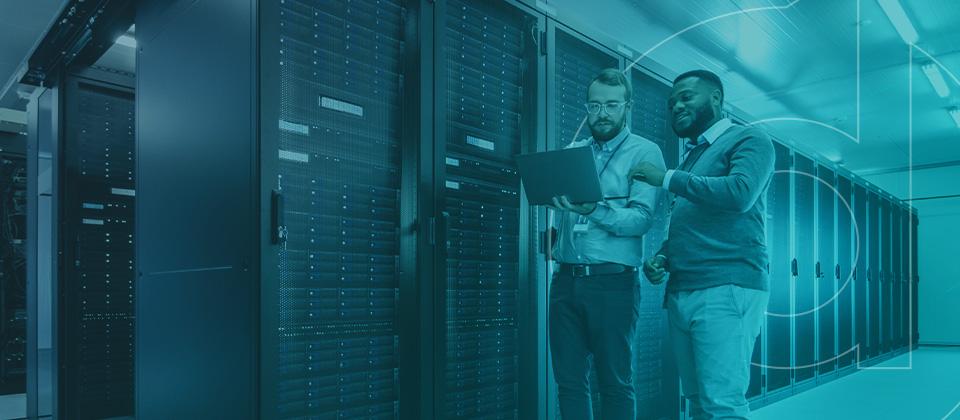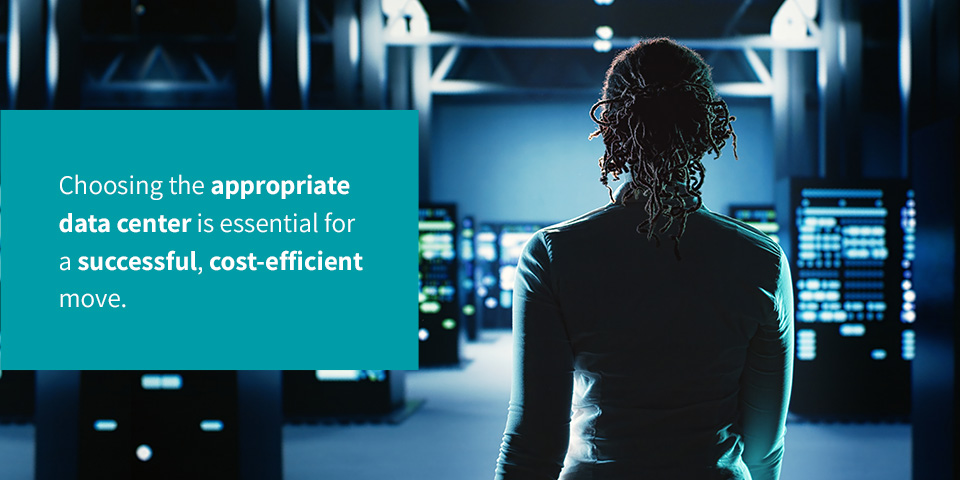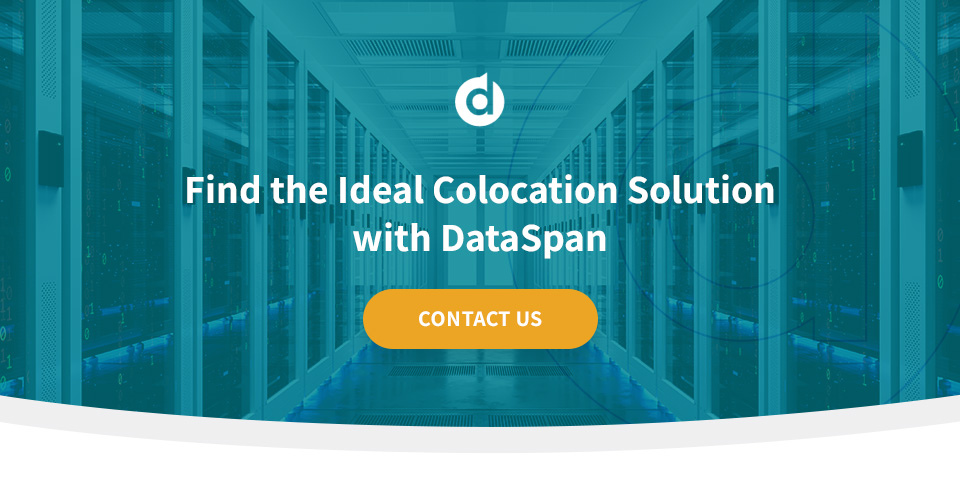
What Are Co-Location Data Centers?
A recent global market report projects the colocation market will expand at a compound annual growth rate of 14.9% over the next few years. Experts predict the market will be worth $124.15 billion by 2028 — a staggering increase from 2023, when it was worth $62.46 billion.
Understanding how colocation works and its benefits reveals why it can be a valuable option for many small-to-medium-sized businesses. This knowledge can also help you determine whether it’s a wise investment for your company.
What Is a Colocation Data Center?
In the traditional colocation data center business model, the client leases a dedicated space in a shared facility to host their IT infrastructure. Because they own the equipment they use, the client is the only one who can access and manage it — meaning they are 100% responsible for all maintenance and oversight.
The colocation facility provides:
- Consistent power supply
- Physical security protections
- Redundancy and disaster recovery
- Building maintenance and overhead
Colocation data centers may seem similar to managed data centers, but the two operate on completely different business models. In a managed data center, you would lease infrastructure from the provider, who would then handle all the administrative and management tasks for you in addition to housing your equipment in a dedicated space.
Though a conventional colo only provides space and security detail, many modern colocation facilities now offer managed services for an additional fee. These extend extra value and convenience to smaller businesses that may lack the staff and resources needed to maintain IT equipment in a separate location.
What Are the Benefits of Colocation Data Centers?
Businesses that move their IT assets to colocation data centers can reap multiple benefits, including optimizing processes and saving costs.
- Privacy and security: You use your infrastructure in a colo, which provides more privacy and data security than a shared public cloud data center. Colocation facilities also provide advanced physical security measures, like biometric building access and intelligent CCTV systems, to protect your equipment from arson and theft.
- Cost savings: A colocation facility reduces your overhead and security expenses in the long term, letting you redirect those funds into other areas of your business.
- High uptime: Most colocation facilities are strategic about location and design, building in areas where natural disasters are infrequent, implementing redundant power systems and creating thorough contingency plans to ensure maximum availability and reliability.
- Easy scalability: As long as your provider has enough space, you can easily upgrade your subscription to add more infrastructure and accommodate higher demand.
- On-premise space: By moving some or all your IT infrastructure off-site, you can increase the available space in your building for storage, office equipment or other needs.
Typically, SMBs that lack the space, resources and IT expertise to deploy an on-premise data center will benefit most from outsourcing.
What Are the Drawbacks to Colocation Data Centers?
Of course, colocation data centers have possible downsides you should consider.
- Maintenance and management: Because you own the infrastructure you host in a colocation facility, you will be responsible for all maintenance operations and costs unless you take advantage of additional services.
- Limited control: As part of your contract, you must follow the center’s rules and regulations, which can make it challenging to conveniently access and manage your equipment.
- High startup costs: The initial investment in a colocation center is typically high due to the costs of moving, upgrading and installing your equipment in the facility.
While colocation centers are highly secure, organizations in strictly regulated industries like health care and government often require an on-premises solution to provide additional control over their infrastructure.
3 Essential Considerations for Choosing a Colocation Data Center

Outsourcing your IT infrastructure to a colo can be a complicated, overwhelming process without adequate preparation and planning. Choosing the appropriate data center is essential for a successful, cost-efficient move.
There are three critical things to do while evaluating your options.
1. Tour the Facility
Most colocation data centers will allow you to take an in-person tour before you sign on. Take advantage of this opportunity to inspect the facility and ask questions.
Here’s a checklist of things to look for while touring the center.
- Location: Ensure the center is in a safe, well-maintained area with low crime.
- Security: Ask what access protections and security systems the facility has, such as CCTV cameras and overnight guard detail.
- Capacity: What is the facility’s current electrical capacity and average usage?
- Expansion potential: Is there enough space available for clients to scale up? Do clients often take advantage of this option?
- Construction and infrastructure: What are the building’s layout and electrical infrastructure like?
2. Forecast Your Future Needs
While most colocation data centers make it easy for clients to expand their resources, you should still confirm your available options before settling on any specific provider.
First, assess your existing workload requirements:
- Storage capacity
- Processing power
- Network bandwidth
- Compliance requirements
Then, consider how your business will evolve and whether your colo provider can continue meeting your expectations.
- Do you experience seasonal demand fluctuations?
- Are you planning to expand operations in the next few years?
- Will you add more resource-intensive technologies, like artificial intelligence and machine learning?
- Are your security requirements likely to change based on your industry and business size?
Discussing these concerns with the colocation centers on your shortlist can help you establish a lasting business relationship with a colocation facility that best suits your organization’s needs.
3. Compare Costs
Most colocation facilities charge monthly or annually. This hosting fee will primarily depend on several factors, including:
- Data center location
- Amount of space
- Additional services
Soliciting and comparing quotes from multiple facilities in your area can help you find a fit for your budget. You’ll also want to factor in operational and maintenance costs, since you’ll be responsible for upkeep on the equipment you own.
Are You Relocating to a Colocation Data Center?
Whatever your industry and business size, the experts at DataSpan are here for you.
Our team will use our decades of experience in data center design and deployment to help you find the ideal colocation solution for your company. We’ll also help you streamline the transition with our comprehensive consolidation, migration and relocation services.
Optimize your data center strategy with a reliable partner by your side. Contact your local DataSpan rep today to set up a consultation.

About the Author: Alex von Hassler’s long term focus is the continued testing, learning, and deployment of modern IT solutions. During his years as a DataSpan team member, his responsibilities grew from managing Salesforce CRM to improving system security, creating marketing initiatives, as well as providing continued support to the highly motivated and experienced team in an ever-changing industry. As DataSpan evolves to provide the best-fitting IT solutions to its customers, Alex von Hassler continues to hone his skills in the world of web-based ERP systems, security, and best customer engagement practices. Empowering such a dynamic team with the right tools provides him with enormous gratification.








